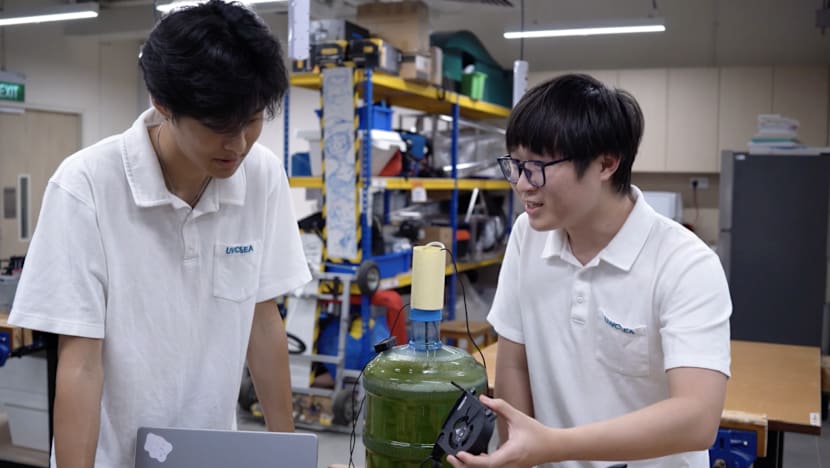Beyond the chat: How WeChat shapes everyday bonds and discoveries
Across family groups and classrooms, people are creating opportunities to stay close and explore fresh possibilities through the app.

Ms Chui Si En (second row, fourth from right) with her loved ones celebrating Chinese New Year in 2024. Photos: Chui Si En

This audio is generated by an AI tool.
For Singaporean Chui Si En, family ties once felt out of reach. While she and her parents lived here, her extended family are in Shenzhen, China.
“When we invited them to Singapore to celebrate Chinese New Year last year, I finally got to know them better,” said the 28-year-old. “I’ve since joined the extended family’s WeChat group to stay updated.”
WeChat has become the thread that keeps both sides in touch. On festive occasions – from Chinese New Year and Dragon Boat Festival to Mother’s Day and Father’s Day – warm greetings and messages of goodwill fly back and forth, weaving a sense of togetherness despite the miles.
With more than 1.4 billion monthly active users worldwide, WeChat and its domestic counterpart Weixin have become much more than messaging platforms. They are now everyday companions – be it for reaching out, making payments or hailing a ride – with many features delivered through Weixin Mini Programs that require no extra downloads.
STAYING CONNECTED, WHEREVER LIFE TAKES YOU

For Ms Chui, WeChat is also a way to explore new places and pursue her passions. Beyond arranging meet-ups with her Shenzhen relatives, she has used the app to enrich her travels abroad.
Ahead of a two-week adventure in Yunnan, China, last year, she and her friends set up a group chat to share plans, swap ideas and refine their itinerary with the help of Mini Programs. “We also added our tour guide on WeChat, which made it easier to coordinate plans,” she said.
With logistics settled, the group could immerse themselves in the journey – from the snow-capped peaks of Jade Dragon Snow Mountain in Lijiang to the rushing waters of Tiger Leaping Gorge and leisurely strolls through towns rich in old-world charm.
In China, WeChat became Ms Chui’s bridge to new friendships. While travelling, she came to know others on the same path: “Since everyone used the app, we added one another to share photos and itineraries. Travelling felt more enjoyable as we exchanged experiences and learnt about one another’s cultures.”
The app’s auto-translate function made these exchanges even smoother. “I used it to check if I understood what they were saying, so I wouldn’t reply out of context,” said Ms Chui.
WeChat also gave her parents peace of mind as she journeyed through Kunming, Dali, Lijiang and Shangri-La. Familiar with the platform, they appreciated the steady stream of check-ins – brief texts and voice notes like ‘I’ve boarded the plane’ or ‘We’ve reached our hotel’ – that assured them she was safe.
Back home in Singapore, Ms Chui uses WeChat to keep up with fellow fans of her favourite K-pop group, Seventeen. After meeting Chinese fans at past concerts and sharing photos and videos with them, she became part of the wider fanbase on the app. “Now I’m in about four or five WeChat groups where we discuss upcoming music and concert tours. We also send gifs, videos and memes and commiserate over how hard it is to get concert tickets.”
For her, these groups have grown into a community. “The enthusiasm shared before, during and after concerts or album launches fuels the spirit of the fandom. There’s a sense of kinship when everyone shares the same excitement.”
In more ways than one, WeChat has become part of Ms Chui’s daily life. Elsewhere, it is giving students and young creators room to develop and share ideas.
WHERE CREATIVITY MEETS POSSIBILITY

Weixin Mini Programs go beyond daily convenience. They act as a sandbox for problem-solving and a gathering point for young tech talents, as seen in the Weixin Mini Program Global Innovation Challenge. Now in its third year, the challenge invites students worldwide to turn bold ideas into practical solutions using the Weixin Mini Program platform. To date, it has reached over 2,000 schools in more than 10 countries, resulting in around 130,000 student-created Mini Programs.
United World College of Southeast Asia’s (UWC) head of innovation, Mr Matthew Weaver, shared that although he was a regular WeChat user when travelling in China, he still found much to explore in the compact and efficient ecosystem once his students began working with the platform as part of the challenge.
“WeChat is more than a social platform – it’s a human-centred suite of platforms and functionalities,” he noted.
Using the Weixin Mini Program and its development tools, UWC students Hanson Ma and Justin Sunchen, both 17, linked a 3D-printed device that grows algae to help purify polluted air to a Mini Program. This enabled users to control the device’s sensors and lighting, and even interact with an AI agent that answers questions about air pollution, algae and the purification process.
Mr Weaver called the challenge “an opportunity for students to apply their knowledge and creativity”.
“WeChat allows UWC students to create, play and foster habits like critical thinking and self-awareness,” he added. “As a single portal, it can showcase student initiatives, interface with Internet of Things projects, provide livestreams and build networks among innovation centres worldwide.”
From Ms Chui’s family chats and community groups to the experiments of young innovators, the app has become a space where people share and discover experiences in meaningful ways.
Download WeChat to stay connected, travel smarter and spark new ideas.















